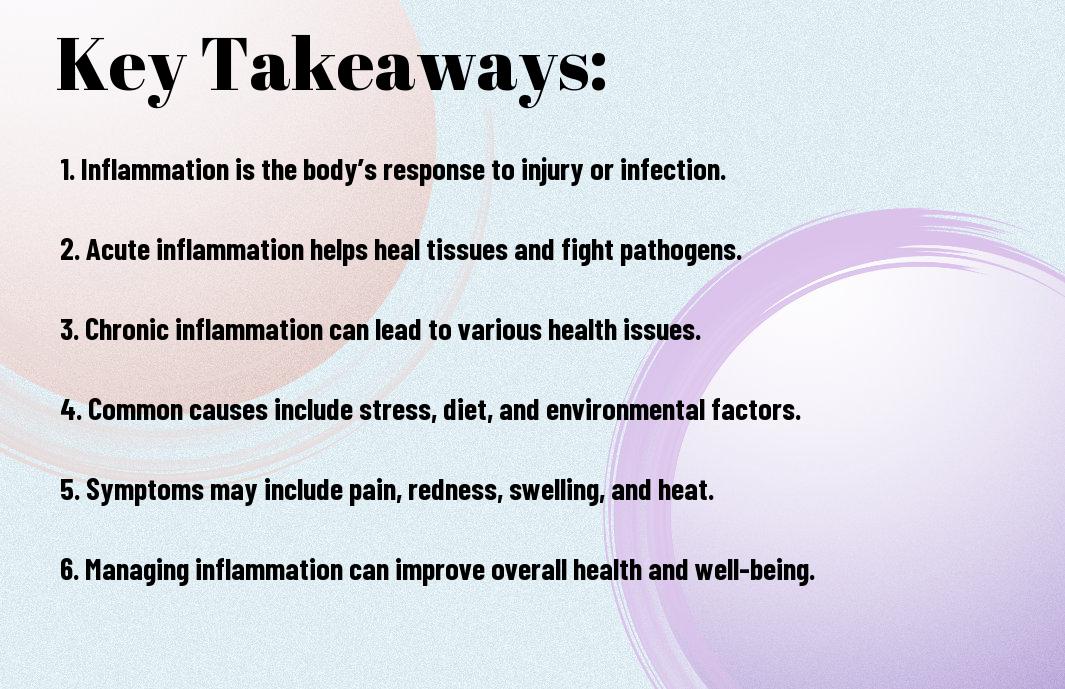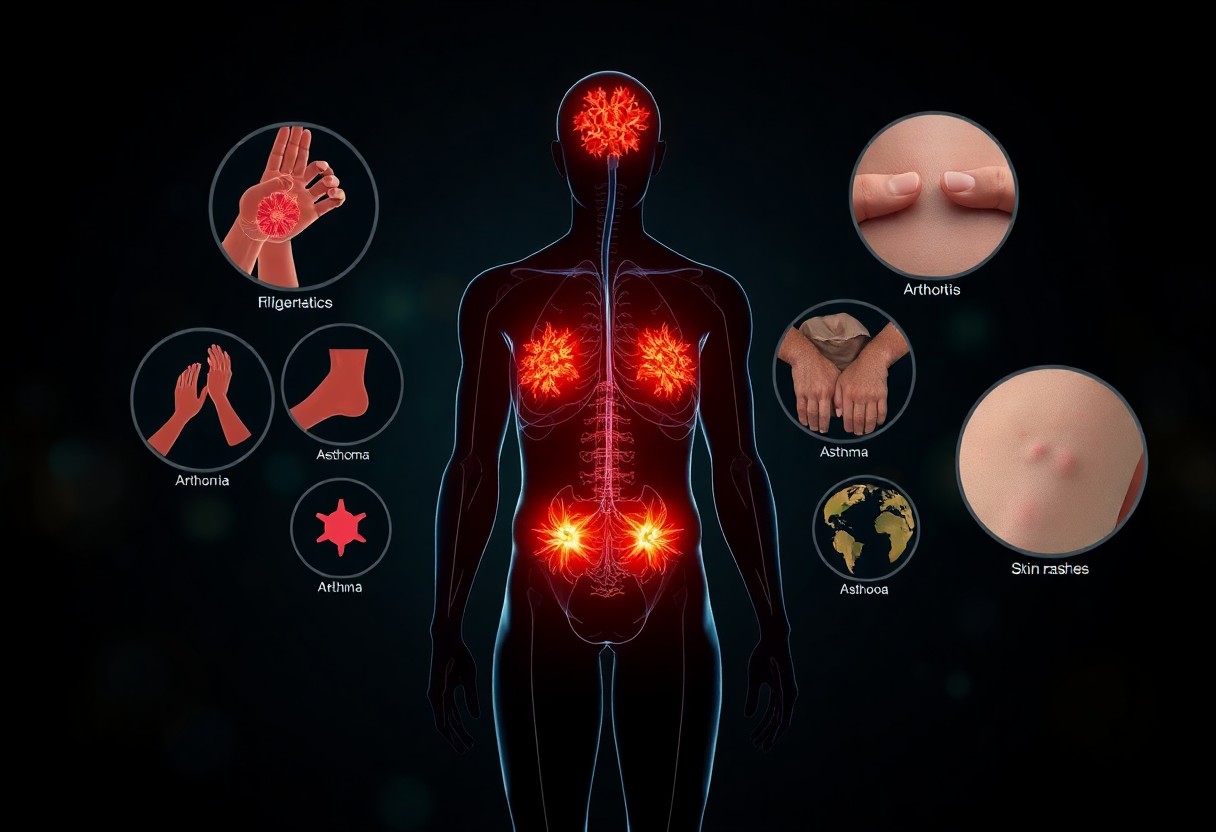As your body’s defense mechanism kicks in, inflammation can be a double-edged sword. On one hand, it helps you fight off infections and heal from injuries. On the other hand, chronic inflammation can lead to serious health issues, such as heart disease and cancer. You need to understand what inflammation is and how it affects your body to take control of your health and prevent potential dangers. By learning more, you can make informed decisions to protect yourself and maintain a healthy lifestyle.
Key Takeaways:
- Inflammation Definition: Inflammation is a natural immune response by the body to protect itself against harmful stimuli, such as pathogens, injuries, or irritants.
- Types of Inflammation: There are two main types of inflammation: acute inflammation, which is a short-term response to injury or infection, and chronic inflammation, which is a long-term response that can lead to various health issues.
- Symptoms of Inflammation: Common symptoms of inflammation include redness, swelling, heat, pain, and loss of function in the affected area.
- Causes of Inflammation: Inflammation can be caused by various factors, including infections, injuries, autoimmune disorders, and lifestyle choices such as a poor diet or lack of exercise.
- Consequences of Inflammation: Chronic inflammation can lead to various health problems, including heart disease, diabetes, cancer, and neurodegenerative diseases, making it important to manage and reduce inflammation to maintain overall well-being.

Causes of Inflammation
To understand inflammation, you need to know what triggers it. Inflammation occurs when your body responds to injury, infection, or damage. This response can be caused by various factors, including infections, injuries, and autoimmune disorders.
Acute Inflammation
The most common type of inflammation is acute, which occurs when you experience a sudden injury or infection. This type of inflammation is short-term and helps your body heal.
Chronic Inflammation
An ongoing, low-grade inflammation can have severe consequences on your overall health. Chronic inflammation can lead to conditions such as arthritis and heart disease.
A significant aspect of chronic inflammation is that it can be silent, meaning you may not even notice it’s happening. As you go about your daily life, your body may be experiencing constant, low-grade inflammation, which can have devastating effects on your long-term health, such as increasing your risk of cancer and neurodegenerative diseases. You should be aware of the warning signs, such as fatigue and joint pain, to take preventative measures.

Symptoms of Inflammation
You may be experiencing inflammation without even realizing it, as the symptoms can be subtle and easy to overlook.
Physical Symptoms
By paying attention to your body, you can identify physical symptoms such as redness, swelling, and pain in affected areas.
Emotional Symptoms
Anxiety and depression can be emotional symptoms of inflammation, affecting your mental well-being.
Indeed, emotional symptoms can have a significant impact on your daily life, leading to fatigue, mood swings, and irritability. You should be aware of these symptoms, as chronic inflammation can have serious consequences on your overall health, making it crucial to address them promptly and seek medical attention if necessary to alleviate discomfort and prevent long-term damage.
Effects on the Body
Once again, you’re facing the dark side of inflammation, and it’s not a pretty sight. Your body is under attack, and the consequences can be devastating. Inflammation can affect your daily life, causing chronic pain and fatigue that can leave you feeling drained and helpless.
Short-Term Effects
Against the backdrop of inflammation, your body’s short-term effects can be alarming. You may experience redness, swelling, and heat in the affected area, making it difficult to move or perform daily tasks. These symptoms can be uncomfortable and frustrating, but they can also be a warning sign of a more serious issue.
Long-Term Effects
Behind the scenes, chronic inflammation can be silently destroying your body. You may not even notice the damage being done, but it can lead to life-threatening conditions like heart disease, diabetes, and cancer. It’s imperative to take action to prevent or manage inflammation to avoid these deadly consequences.
At the heart of the matter, long-term effects of inflammation can be catastrophic. As you continue to suffer from chronic inflammation, you’re at a higher risk of developing debilitating diseases that can destroy your quality of life. You must take control of your health and make lifestyle changes to reduce inflammation and protect your body from the ravages of time. By doing so, you can avoid the grim consequences of chronic inflammation and live a healthier, happier life.

Types of Inflammation
After understanding the concept of inflammation, you’ll find that it can be categorized into different types, including:
- Acute
- Chronic
Thou should note the following table for more information:
| Type | Description |
|---|---|
| Acute | Short-term inflammation |
| Chronic | Long-term inflammation |
| Localized | Limited to a specific area |
| Systemic | Affects the entire body |
| Autoimmune | Immune system attacks healthy cells |
Localized Inflammation
Toward the beginning of your journey to understand inflammation, you’ll notice that localized inflammation occurs in a specific area of your body, such as a cut or infection, and is usually characterized by redness, swelling, and pain.
Systemic Inflammation
Albeit systemic inflammation is a more severe type, you should be aware that it affects your entire body and can be caused by infections, autoimmune disorders, or other chronic conditions.
Inflammation that becomes chronic can lead to serious health problems, such as heart disease, diabetes, and cancer. As you probe deeper into the world of inflammation, you’ll discover that your body’s natural response to injury or infection can have positive effects, such as healing and protection against harmful pathogens. However, when inflammation becomes uncontrolled, it can have devastating consequences for your overall health and well-being.

Treatment and Management
Unlike other conditions, inflammation can be managed with the right approach. You can take control of your body’s response to inflammation and reduce its negative effects.
Medical Treatments
With the help of your doctor, you can explore various medical treatments, including anti-inflammatory medications and therapies to alleviate symptoms and prevent further damage to your body.
Lifestyle Changes
Likewise, lifestyle modifications play a significant role in managing inflammation, and you can start by making healthy dietary choices and exercising regularly to reduce your risk of chronic inflammation.
Plus, as you incorporate these changes into your daily routine, you’ll notice a significant reduction in inflammatory markers and an improvement in your overall well-being, allowing you to take charge of your health and minimize the risks associated with chronic inflammation, which can lead to serious health problems if left unaddressed.
Prevention Strategies
Despite the potential dangers of inflammation, you can take steps to protect your body. By making informed choices, you can reduce your risk of inflammation and its devastating effects.
Dietary Changes
To tackle inflammation, you should focus on consuming anti-inflammatory foods like fatty fish and leafy greens, which can help mitigate its impact on your body.
Stress Reduction
Between the demands of daily life, it’s easy to get caught up in chronic stress, which can exacerbate inflammation and wreak havoc on your health.
Dietary habits aside, managing stress is vital to preventing inflammation. When you’re under stress, your body produces inflammatory chemicals that can lead to a host of problems, including chronic diseases like arthritis and diabetes. By finding healthy ways to cope with stress, such as meditation or exercise, you can reduce your risk of inflammation and maintain a healthy balance in your body.
Conclusion
From above, you’ve learned that inflammation can be a double-edged sword, protecting your body from harm, but also potentially causing damage. As you now understand the effects of inflammation on your body, you can take steps to manage it, reducing your risk of chronic diseases and promoting overall well-being. You’ll be better equipped to make informed decisions about your health, and your body will thank you.
FAQ
Q: What is inflammation and how does it occur in the body?
A: Inflammation is a natural response of the body’s immune system to injury, infection, or damage. It occurs when the body’s defenses detect the presence of harmful pathogens, such as bacteria or viruses, and send white blood cells to the affected area to fight off the invaders. This process involves the release of chemical signals, which cause blood vessels to dilate, leading to increased blood flow, swelling, and the characteristic redness and warmth associated with inflammation.
Q: What are the different types of inflammation and how do they affect the body?
A: There are two main types of inflammation: acute and chronic. Acute inflammation is a short-term response to injury or infection, and it typically resolves on its own once the underlying cause is addressed. Chronic inflammation, on the other hand, is a long-term, persistent condition that can lead to tissue damage and contribute to various diseases, such as arthritis, diabetes, and cardiovascular disease. Additionally, there are also different forms of inflammation, including localized inflammation, which affects a specific area of the body, and systemic inflammation, which affects the entire body.
Q: What are the common causes of inflammation in the body?
A: Inflammation can be caused by a variety of factors, including infections, injuries, autoimmune disorders, and lifestyle factors. Common causes of inflammation include bacterial and viral infections, physical trauma, allergies, and autoimmune diseases such as rheumatoid arthritis and lupus. Additionally, lifestyle factors such as a poor diet, lack of exercise, stress, and exposure to environmental toxins can also contribute to inflammation in the body.
Q: How does inflammation affect the body’s organs and systems?
A: Inflammation can affect various organs and systems in the body, including the skin, joints, digestive system, cardiovascular system, and nervous system. For example, inflammation in the joints can cause pain, stiffness, and limited mobility, while inflammation in the digestive system can lead to conditions such as irritable bowel syndrome. Inflammation can also affect the cardiovascular system, increasing the risk of heart disease and stroke, and the nervous system, contributing to conditions such as multiple sclerosis and Alzheimer’s disease.
Q: How can inflammation be managed and prevented?
A: Inflammation can be managed and prevented through a combination of lifestyle changes and medical treatments. Lifestyle changes include maintaining a healthy diet rich in fruits, vegetables, and whole grains, engaging in regular exercise, managing stress, and getting adequate sleep. Medical treatments may include anti-inflammatory medications, antibiotics, and other therapies aimed at addressing the underlying cause of the inflammation. Additionally, alternative therapies such as acupuncture, herbal supplements, and mind-body practices like meditation and yoga may also help to reduce inflammation and promote overall health and well-being.



